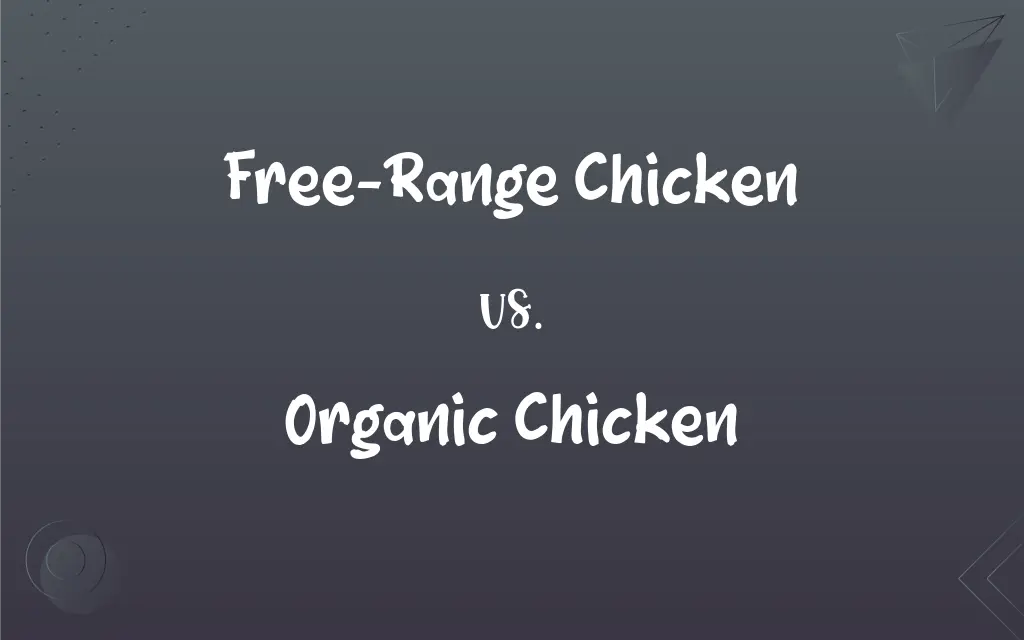Free-Range Chicken vs. Organic Chicken: What's the Difference?
Edited by Aimie Carlson || By Janet White || Published on May 15, 2024
Free-range chickens have outdoor access; organic chickens are raised on organic feed without synthetic additives.

Key Differences
Free-range chicken refers to chickens that have some degree of outdoor access, allowing them to roam outside, engage in natural behaviors, and potentially enjoy a more varied diet. Organic chicken, on the other hand, emphasizes the feed and overall farming practices, requiring organic feed and prohibiting the use of synthetic pesticides, antibiotics, and GMOs.
Organic chicken is raised under specific certification standards that mandate organic feed and restrict the use of synthetic additives, ensuring the birds are not given antibiotics or hormones. Free-range chicken, while having access to the outdoors, does not necessarily mean they are fed organic feed or raised without antibiotics unless specifically stated.
The label "free-range" primarily indicates the birds' living conditions, focusing on welfare aspects such as space and outdoor access. Organic certification covers a broader spectrum of considerations, including feed quality, environmental impact, and animal welfare, making it a more comprehensive standard.
Regulations for free-range chickens can vary, with minimal standards for outdoor access that might not guarantee extensive roaming space. Organic standards, however, are more uniform, requiring adherence to strict organic farming practices that benefit from more rigorous enforcement and certification processes.
Free-range chicken farming prioritizes outdoor access for the birds, while organic chicken farming combines welfare considerations with environmental and health standards, making the organic label indicative of a holistic approach to poultry farming.
ADVERTISEMENT
Comparison Chart
Definition
Chickens have access to the outdoors.
Chickens are raised on organic feed without synthetic additives.
Feed
Not specified; may not be organic.
Must be 100% organic feed.
Antibiotics Use
May be used unless otherwise specified.
Prohibited.
Access to Outdoors
Required, but the extent can vary.
Required, with specific standards for space and quality.
Certification
Varies; less strict than organic.
Must meet strict USDA organic standards.
ADVERTISEMENT
Free-Range Chicken and Organic Chicken Definitions
Free-Range Chicken
Free-range chickens are not confined to cages and can roam outside.
You can taste the difference when you eat eggs from free-range chickens.
Organic Chicken
The term implies adherence to organic agricultural practices from feed to farming.
Our organic chicken is certified to ensure the highest quality and safety.
Free-Range Chicken
Free-range denotes a method of farming where chickens have some level of outdoor access.
Our farm raises free-range chickens to ensure they live happier lives.
Organic Chicken
These chickens are raised under strict organic farming standards.
Buying organic chicken ensures you're avoiding antibiotics and hormones.
Free-Range Chicken
These chickens have the freedom to engage in natural behaviors outdoors.
The free-range chickens chased each other across the field.
Organic Chicken
Organic chicken is raised on a diet of organic feed without synthetic pesticides.
The organic chicken in this dish comes from birds fed only organic grains.
Free-Range Chicken
Free-range chicken refers to poultry allowed outdoor access.
The free-range chickens were pecking around the barnyard, enjoying the sunshine.
Organic Chicken
Organic chicken farming focuses on sustainability and animal welfare.
Choosing organic chicken supports environmentally friendly farming practices.
Free-Range Chicken
The term suggests a more humane approach to poultry farming.
I prefer buying free-range chicken because I support animal welfare.
Organic Chicken
Organic certification prohibits the use of antibiotics and growth hormones in chickens.
Organic chicken is healthier because it's raised without harmful additives.
FAQs
What qualifies a chicken as free-range?
A chicken that has access to the outdoors for part of its life.
What does organic chicken mean?
Chicken raised on organic feed without synthetic pesticides or fertilizers, antibiotics, or growth hormones.
What are the health benefits of eating organic chicken?
Organic chicken is free from antibiotics and synthetic feed additives, potentially reducing exposure to harmful substances.
How are free-range chickens different from cage-free chickens?
Free-range chickens have outdoor access, whereas cage-free chickens may not.
Do free-range chickens have a better quality of life?
Generally, they have more natural behaviors and better welfare than chickens without outdoor access.
How can consumers verify if chicken is truly free-range or organic?
Look for certification labels from reputable organizations.
What are the environmental benefits of organic chicken farming?
It supports biodiversity, soil health, and reduces chemical use.
Can a chicken be both free-range and organic?
Yes, if it meets the outdoor access requirements of free-range and is raised on organic feed.
Is organic chicken more expensive than free-range chicken?
Typically, yes, due to the higher standards and costs of organic farming.
Are there any taste differences between free-range and organic chicken?
Some people claim organic and free-range chicken has a superior taste due to their diet and lifestyle.
How do free-range conditions affect chicken health?
Outdoor access can promote healthier, more robust physical and mental states in chickens.
Can free-range chickens eat organic feed?
Yes, but it's not a requirement for the free-range label unless it's also certified organic.
What does the term "pasture-raised" mean in comparison to free-range?
Pasture-raised implies more extensive access to outdoor space compared to standard free-range.
What certifications should I look for when buying free-range or organic chicken?
USDA Organic for organic chicken; look for specific free-range certifications or claims verified by third parties.
Are there any regulations regarding the labeling of free-range and organic chickens?
Yes, both have specific regulatory standards, especially organic, which is strictly regulated by the USDA.
Why are organic chickens typically not given antibiotics?
Organic standards prioritize natural resistance and health without reliance on antibiotics.
Is it worth the extra cost to buy organic chicken?
Many consumers believe the benefits to health, animal welfare, and the environment justify the cost.
Can all free-range chickens fly?
Not necessarily; breed and space limitations affect their ability to fly.
Do organic chickens grow at the same rate as conventional chickens?
They might grow slower due to natural feed and lack of growth hormones, contributing to a different texture and flavor.
What impact does buying organic chicken have on the farming industry?
It supports farming practices that are more sustainable and animal-friendly.
About Author
Written by
Janet WhiteJanet White has been an esteemed writer and blogger for Difference Wiki. Holding a Master's degree in Science and Medical Journalism from the prestigious Boston University, she has consistently demonstrated her expertise and passion for her field. When she's not immersed in her work, Janet relishes her time exercising, delving into a good book, and cherishing moments with friends and family.
Edited by
Aimie CarlsonAimie Carlson, holding a master's degree in English literature, is a fervent English language enthusiast. She lends her writing talents to Difference Wiki, a prominent website that specializes in comparisons, offering readers insightful analyses that both captivate and inform.






































































